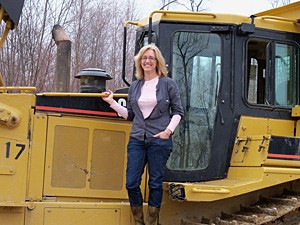
UC Doctoral Student s Research Digs Deep into the Fracking Controversy
The turmoil in oil-producing nations is triggering turmoil at home, as rising oil prices force Americans to pay more at the pump. Meanwhile, theres a growing industry thats promising jobs and access to cheaper energy resources on American soil, but its not without its controversy. Deborah Kittner, a University of Cincinnati doctoral student in geography, presents, Whats the Fracking Problem? Extraction Industrys Neglect of the Locals in the Pennsylvania Marcellus Region, at the annual meeting of the Association of American Geographers. Kittner will be presenting April 14 at the meeting in Seattle. She is part of a large contingent of UC researchers to be presenting at the conference.
Hydraulic fracturing, or fracking, involves using millions of gallons of water, sand and a chemical cocktail to break up organic-rich shale to release natural gas resources. Kittners research examined the industry in Pennsylvania, known as the sweet spot for this resource, because of the abundance of natural gas. Pittsburgh has now outlawed fracking in its city limits as has Buffalo, N.Y., amid concerns that chemical leaks could contaminate groundwater, wells and other water resources.
The EPA is now doing additional study on the relationship of hydraulic fracturing and drinking water and groundwater after congress stated its concern about the potential adverse impact that the process may have on water quality and public health. Kittner attended an EPA hearing and also interviewed people in the hydraulic fracturing industry. She says billions of dollars from domestic as well as international sources have been invested in the industry.
The chemical cocktail used in the process is actually relatively small. The mixture is about 95-percent water, nearly five percent sand, and the rest chemical, yet, Kittner says some of those chemicals are known toxins and carcinogens, hence, the not in my backyard backlash from communities that can be prospects for drilling. The flow-back water from drilling is naturally a very salty brine, prone to bacterial growth, and potentially contaminated with heavy metals, Kittner says. In addition, theres the question of how to properly dispose of millions of gallons of contaminated water, as well as concerns about trucking it on winding, rural back roads.
Based on her research, Kittner says that many in the industry are working to be environmentally responsible, and become frustrated at companies that do otherwise.
I think that the study that the EPA is doing is going to be really helpful, and the industry however reluctant to new regulations is working with the EPA on this, Kittner says.
Kittner has lived in Ft. Thomas, Ky., for two decades, but is originally from Warren, Pa. Her research took her to an EPA public meeting in Canonsburg, Pa., where she audio-taped 114 people presenting public statements of what they wanted the EPA study to examine. That study is expected to be completed in 2012 and will include an examination of what to do with millions of gallons of contaminated flow-back water.
Related Stories
What is Biology?
April 10, 2025
Biologists' work impact life every day. From disease research and medical enhancements to protecting ecosystems across the planet, the work of biologists is needed to improve the world. And majoring in biological sciences within UC’s College of Arts and Science will allow you to gain a perspective that focuses on the betterment of the world around you. Spanning from different topics like molecular and cell studies to conservation efforts, there’s is something for everyone.
UC tracks ‘evolving’ opioid epidemic across US
April 10, 2025
The heart of the opioid epidemic that killed 665,341 people in the United States between 2005 and 2020 shifted geographically from the Pacific Northwest to the East, according to a new geographical analysis.
UC grad takes liberal arts path to study medicine at Johns...
April 9, 2025
A career in healthcare has numerous different pathways and not each one is the same. Some students choose the traditional track, while others try a different approach to success. Jordan “Mint” Sewell can attest to this.
